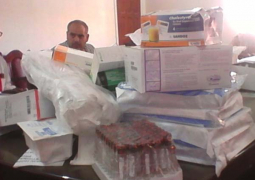
The Central Bank of The Gambia, in collaboration with the West African Monetary Institute under the West African Monetary Zone Integration programme, has embarked on the modernization of the country’s payments, clearing and settlement system infrastructure.
As part of the bank’s sensitization campaign on the new development, a press briefing was yesterday organised at the Central Bank’s boardroom in Banjul.
Speaking on the occasion, Amadou Colley, Governor of the Central Bank of The Gambia, said the initiative forms part of a regional payments system initiative and integral part of the prerequisites for effective West African monetary integration.
“The initiative is also part of central bank’s strategic vision of modernizing the payments and settlement system into a world class standard, comparable to the rest of the world,” it added.
Governor Colley added that the system will lower costs, make payments and settlement more accurate and pave the way for increased financial innovations in the country.
The process spans across different facets and includes the establishment of the real-time gross settlement system (RTGS), the automated cheque processing automated clearing house (ACP-ACH), securities settlement system (SSS) and an electronic national switch for retail payments.
The rationale for the project can be summarised as follows:
The Gambia remains a cash-based economy, with payments of large value transactions requiring heavy movement of cash and its attendant risks, The continued dependence on cash payments also results to delays in cheque processing and inefficiency,
The cost of printing currency is quite high, thus the substitution of banknotes in favour of plastic cards under the national switch project will alleviate this problem.
The central bank currently operates a manual cheque clearing system where commercial banks meet to physically exchange cheques and net balances settled through their current accounts held with central bank, which is time consuming and less efficient in detecting cheque frauds.
The delay in confirmation of customers’ balances due to the lack of real-time gross settlement systems results to the acceptance of cheques turn out to be dishonored due to various reasons.
Governor Colley said that The Gambia has registered significant progress in her socio-economic development, with growth rates of GDP averaging between 5 and 6 per cent per annum.
These gains will be consolidated through the modernization of the payments system and the creation of an environment conducive for further growth.
According to Governor Colley, the system when fully functional will help the bank to achieve the following objectives:
Eliminate or minimize risks associated with payments, clearing and settlement system.
The process will eliminate float time for cheque clearance, with the possibility of reducing the clearance time from five days to one day in addition to combating fraud and forgery.
The system will pave way for reducing high cash intensity and gradual migration to high usage of electronic modes of payment.
The system will also bring efficiency to government receipts and payments and all other consumers, and leverage them for financial deepening of the economy.
There will also be compliance with international principles and standards, especially the core principles for the systematically important payments system (SIPS) of the central Bank for International Settlement (BIS).
The modernization of the payment system will enhance the Central Bank’s monetary management capabilities.
“The public is hereby informed that under the new system, all cheques payable through our banking system shall be in compliance with specific characteristics critical among which is the Magnetic Ink Character Recognition (MICR) code.”
The MICR represents a unique code which is inscribed on each cheque leaf and forms the basis of electronic processing.
Once the cheque passes through a scanner, an image is generated, which passes through the system electronically for timely confirmation of customer balances and the immediate payment of beneficiaries where applicable.
The CBG governor however said that the scanner cannot capture images of damaged cheques, which may result to processing failure.
Cheques may be damaged through any one or a combination of failures, some of which are:
Writing on the MICR code area; folding of cheques in a form which may prevent its passage through the scanning machine; and soiling of cheques with oils, paints or other permanent marks.
He also said that wearing and tearing of cheques due to poor storage facilities, and stapling of cheques and forgeries aimed at defrauding the system cannot also be captured.
“The central bank wishes to further inform the general public that banks are adequately equipped with the means for the implementation of the above measures,” the CBG governor said.
“The bank hereby solicits the cooperation of the public in ensuring full implementation of the new payments system projects, which will contribute a long way towards the development of our country.”



